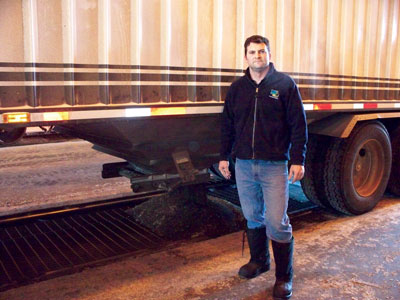
Features
Business & Policy
Business Management
Crushers pay for higher oil content
In Canada, the list of crushers offering a premium for high-oil canola is growing. Like anything in business, the only reason they’re offering more money for higher oil is that it benefits their business.
May 4, 2009 By Editorial Staff
In Canada, the list of crushers offering a premium for high-oil canola is growing. Like anything in business, the only reason they’re offering more money for higher oil is that it benefits their business. “From a crusher point of view, the average oil content we received this year was 43.7 percent,” says Russ Erb, grain manager at Associated Proteins in Ste. Agathe, Manitoba. “But we’ve had canola from 41 to 48 percent.”
 |
| Russ Erb says farmers could earn up to $1 per bushel if they were paid on the basis of oil content. Photo courtesy of Associated Proteins. |
“If the industry went to a true 100 percent premium where we paid based on oil content, growers delivering higher oil canola could earn an extra $1 per bushel,” says Erb. “No one is crushing for canola meal over oil.”
Recognizing the benefits of higher oil content, the Canola Council of Canada has a target of an average of 45 percent oil content by 2015. “One thing that the canola industry is doing to achieve that goal is setting higher standards for minimum oil content for new varieties that are registered,” says Dave Hickling, vice-president of canola utilization at the Canola Council.
In Australia, canola producers are paid based on oil content says Darcy Rafoss, marketing manager, key end-use accounts for Pioneer Hi-Bred, based in Wynyard, Saskatchewan. “There are a lot of benefits to the processor derived from crushing canola with a higher oil content,” says Rafoss.
In the past, a few crushers did offer an oil premium, but as more varieties are now available with higher oil content, more crushers are starting to pass on some of the increased efficiencies they find by crushing canola with higher oil content. And with crush capacity increasing dramatically with new plants coming online in Western Canada in response to the biodiesel industry, the market is showing that it makes sense to further refine canola in Canada.
Growing high-oil canola is not something that happens by chance. Choosing the right genetics is the first management practice listed in the document “Management practices to increase oil content in your canola crop”, produced by the Canola Council of Canada and available from their website, www.canolacouncil.org. Finding the right fertility balance, seeding early and harvesting later were the other components.
Unfortunately, the Prairie Canola Variety Trial results do not include oil content in the variety descriptions. As a result, farmers looking for higher oil varieties have to do their homework by talking to seed retailers or crushers.
At Associated Proteins, Erb has a good handle on which varieties deliver the highest oil content. “For quite a few years now Pioneer Hi-Bred genetics have been the leaders in oil content of the hybrids delivered to our facility,” says Erb.
Erb’s comment is no surprise to Rafoss. “Our canola breeders have been selecting for top-performing canola genetics with high-oil content for over 20 years. The oil content of our current leader hybrids shows that our long-term effort to develop high-oil genetics has paid off,” confirms Rafoss.
The premium offered by Associated Proteins is one based on the crusher getting first right of refusal of the grower’s crop. For every one percent of oil above 43 percent, Associated Protein pays $3.00 per tonne. In return for a chance at the premium, the grower needs to give Associated Proteins first crack at buying the crop. If they are not the highest bidder, the grower can sell it elsewhere. “As a crusher, we tell growers to aim at the higher oil content hybrids,” says Erb. “The bottom line at this stage, is that farmers are still going to base decisions on yield and weed control. But now they should also consider oil content because of the premium.”
Bunge Canada at Harrowby, Manitoba is also offering a contract for 2009 with a $5.00 per tonne premium on loads that test one percent higher than the commercial average taken from samples in October and November or $10.00 per tonne for loads that test two percent higher. That premium is being paid when growers deliver Pioneer brand 45H26 or 45H28.
Through a number of different offers and premiums, the canola processing industry is showing an interest in higher oil content canola. Shop around. Look for the right combination of oil premiums and high yielding genetics. Growers who play their cards right, you could get paid for delivering exactly that.